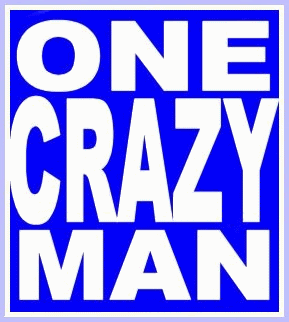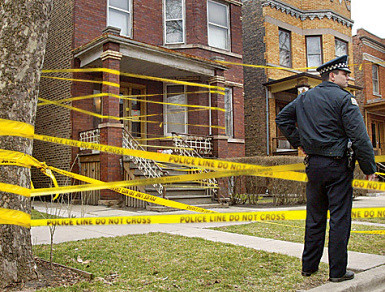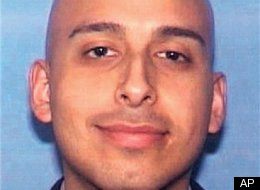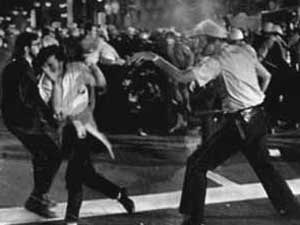

1968: A Convention in Crisis
As the 1968 Democratic National Convention approached, events throughout the nation combined to create a tense atmosphere in Chicago. Rising sentiment against the war in Vietnam, the assassinations of Martin Luther King Jr. and Robert Kennedy, and the failure of the Democratic Party to apply its civil rights policy had an effect both inside and outside of the International Amphitheatre, where the convention delegates gathered.
Officer Mike Schumacher lives in an eighteenth floor apartment overlooking Grant Park. From his balcony, you can see the Conrad Hilton Hotel where convention delegates and presidential candidates stayed during the '68 convention.
SCHUMACHER: It's the larger building. You can see almost like it looks like an 'H' in the center for Hilton.
There are reminders of '68 inside his apartment as well.
Pig is of course the name that hippies and others shouted at cops in the late sixties. Schumacher heard that and worse when he was trying to keep protestors away from the many dignitaries staying at the Conrad Hilton. Last Friday we walked the area around the hotel on South Michigan Ave. We went across the street to Grant Park and Schumacher smiled as he climbed up a berm that must be at least 30 feet high.
SCHUMACHER: Now you're walking in a place of great history here.
At the top of the berm is a two-story tall statue of a man on a horse.
SCHUMACHER: This was covered with guys up above and hanging from up there. One of the places that they liked to take their picture, Abbie Hoffman and all the rest of them was right here. These trees were shorter back forty years ago and Hilton used to have a sign right on the side of it "Conrad Hilton" and so this was their elevated view and you can see to this day it's a great podium.
Schumacher says thousands of protestors filled the park around the raised statue. And he remembers being a block north at the corner of Balbo and Michigan hauling people off to the lock-up.
SCHUMACHER: They were blocking traffic, laying down in the street, you know walking across the street, jaywalking.
But they weren't all so peaceful.
SCHUMACHER: I actually saw one police officer whose riot helmet was crushed by a large rock. I took him into the police station myself. If he didn't have a riot helmet on at the time it would have crushed his skull and killed him. Armed with batons, police fought back hitting not only protestors, but bystanders and journalists as well.
Images of the clashes were broadcast around the world and Mayor Daley was condemned and the incidents were referred to as police riots. To defend itself, the city of Chicago produced an hour-long broadcast that aired a few weeks after the convention. In it, a police commander who was actually Schumacher's boss at the time, shows the television audience weapons taken from protestors.
SOT: There are things on this table for instance, the broken slats from the benches in the park where weapons were picked up on the moment and used. Broken bottles, broken glass bent knives, pieces of brick, many projectiles.
Other favorite projectiles were bags of feces and cans filled with urine. Schumacher says though there were some instances of unnecessary police force, he says the cops did a good job under chaotic circumstances.
SCHUMACHER: There's a lot of adrenaline that gets moving. There's a lot of anger that takes place and quite often, if you've just been slapped in the face with a bag of sh*t it's really hard to say to that policeman whose now got the guy that did it, handcuff him officer and very calmly don't say anything or do anything.
Schumacher says that doesn't excuse bad police behavior and he doesn't condone it, but he says it does put police excesses into context. In the end, Schumacher says protestors wanted a confrontation with police and would have escalated the violence until they got it. He points out that despite the abuses hurled at officers, they never drew their guns and no protestors were killed that week. And he thinks the strong police response also sent the message to protestors around the country that if they come to Chicago looking for trouble, they'll find it.
(Months before the convention, political activists planned demonstrations in Chicago to share the spotlight with the Democratic political leaders. Some groups, such as the Yippies, came to Chicago determined to challenge traditional political process and authority. Tensions increased and turned into violence when police refused to allow these groups near the main hotels and the conventional hall.
______________________________________________________________________
100 protesters injured 119 policeman injured
The 1968 convention has shined a bad light on the Chicago Police Dept when in reality it was a two-way street
Some of the protesters were not peaceful they came for a confrontation and they got one by throwing rocks , feces , urine , trying to gain access were they were not allowed
11,500 police did not beat everyone up just as 10,000 protesters were not all violent
STEREOTYPING is what Cop watch is good at they are a HATE group plan & simple



















